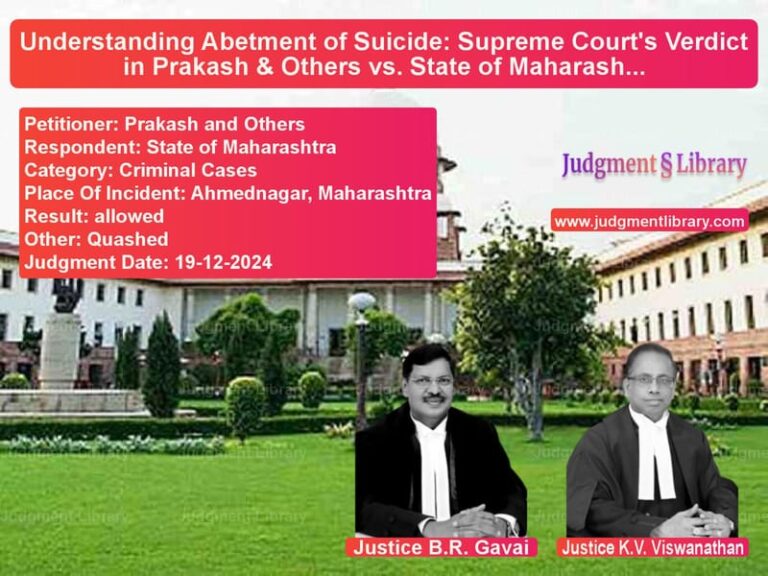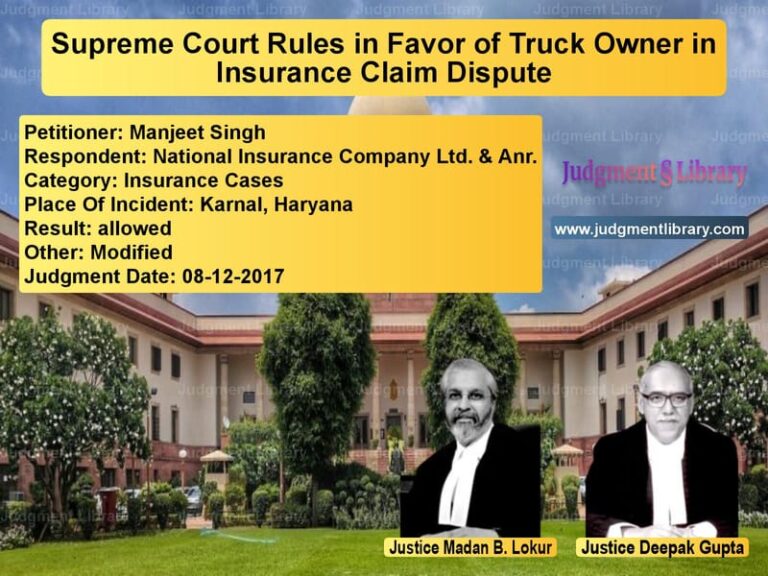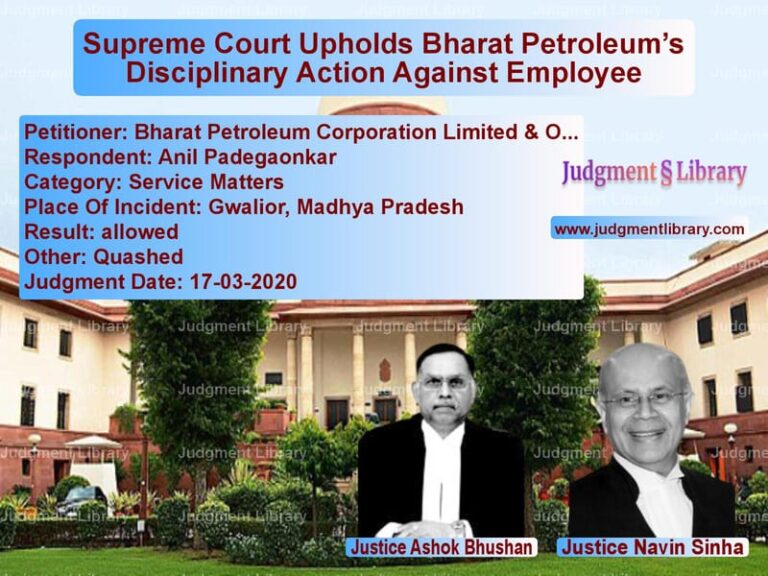Supreme Court Restores Appeal After Breach of Compromise Agreement in Property Dispute
The Supreme Court of India, in the case of Navratan Lal Sharma vs. Radha Mohan Sharma & Others, dealt with a crucial legal issue regarding the restoration of an appeal when a compromise agreement is not honored. The judgment clarifies the scope of Order 23, Rule 3 of the Code of Civil Procedure (CPC) and the right of an aggrieved party to seek restoration of an appeal if the agreed terms of compromise are violated.
Background of the Case
The dispute arose over the ownership and transaction of a property for which the appellant, Navratan Lal Sharma, had initially filed a suit seeking:
- Cancellation of two power of attorney documents dated July 19, 2010 and July 27, 2010.
- Cancellation of two sale deeds dated August 31, 2010 and September 15, 2010.
- A permanent and mandatory injunction against the respondents.
The Trial Court dismissed the suit on February 17, 2014. The appellant then filed a first appeal before the Rajasthan High Court.
Compromise Agreement During Appeal
During the pendency of the first appeal, the appellant and Respondent No. 2 entered into a compromise agreement on May 18, 2022, with a corrigendum agreement executed on July 8, 2022. The terms included:
- The suit property was to be developed, and specific amounts were to be paid to the appellant.
- A cheque of Rs.11,00,000 was issued to the appellant as part of the agreement.
- If the agreed payments were not honored or if any cheque was dishonored, the appellant had the right to seek restoration of the appeal (Clause 4 of the agreement).
Based on this agreement, the parties moved an application under Order 23, Rule 3 CPC to dispose of the appeal. The Rajasthan High Court recorded the compromise on July 14, 2022, and disposed of the appeal but explicitly denied the right to restoration.
Non-Compliance with the Compromise Terms
After the High Court disposed of the appeal:
- The cheques issued by Respondent No. 2 were dishonored.
- The respondent allegedly interfered with the appellant’s possession of the property.
- The respondent attempted to get the land converted without paying the agreed amounts.
As a result, the appellant moved an application for restoration of the appeal, alleging fraud and non-compliance with the compromise agreement.
High Court’s Refusal to Restore the Appeal
On October 19, 2023, the Rajasthan High Court rejected the restoration application, stating that:
- The order dated July 14, 2022, clearly stated that the appeal could not be restored.
- Since the appellant had consented to the compromise, he was aware that restoration was not permitted.
- The appellant could seek alternative legal remedies but not restoration of the appeal.
Aggrieved by this, the appellant approached the Supreme Court.
Supreme Court’s Observations
The Supreme Court examined the relevant provisions of CPC and previous judicial precedents. It noted:
On the Right to Restore an Appeal
- Order 23, Rule 3 CPC allows courts to record compromise agreements and pass decrees accordingly.
- Order 23, Rule 3A CPC bars fresh suits to challenge compromise decrees.
- The only available remedy is to seek recall or restoration of the appeal before the same court.
The Court held that a party cannot be denied this right merely because the original order disposing of the appeal did not explicitly grant such liberty.
On Fraud and Non-Compliance
The Supreme Court emphasized:
“The Explanation to Order 23, Rule 3 clearly states that agreements that are void or voidable under the Indian Contract Act shall not be deemed lawful. When a party alleges fraud, the court has the duty to examine its legality.”
It further noted:
“A consent decree is nothing but a contract between parties with the court’s approval. Its validity depends on the enforceability of the agreement itself.”
On the High Court’s Error
The Supreme Court ruled that the Rajasthan High Court had erred by refusing restoration solely on procedural grounds. It observed:
- Refusing restoration curtails statutory remedies available under CPC.
- When a compromise is not honored, the aggrieved party must have a mechanism to seek redress.
- Public policy dictates that courts should not allow procedural barriers to defeat substantive justice.
Final Verdict
The Supreme Court:
- Set aside the Rajasthan High Court’s order of October 19, 2023.
- Allowed the appeal and remanded the case back to the High Court for reconsideration.
- Directed the High Court to decide the restoration application on its own merits, rather than rejecting it on technical grounds.
Implications of the Judgment
This judgment clarifies important legal principles:
- Compromise agreements must be honored: If one party fails to comply, the other has a right to seek restoration.
- Restoration applications must be heard on merits: Courts cannot reject them purely on procedural grounds.
- Fraud allegations require judicial scrutiny: When a party claims non-compliance, courts must investigate rather than deny relief outright.
The Supreme Court’s decision reinforces the principle that procedural rules should not be used to defeat the ends of justice, especially in cases where compromise agreements are breached.
Petitioner Name: Navratan Lal Sharma.Respondent Name: Radha Mohan Sharma & Others.Judgment By: Justice Pamidighantam Sri Narasimha, Justice Manoj Misra.Place Of Incident: Rajasthan.Judgment Date: 11-12-2024.
Don’t miss out on the full details! Download the complete judgment in PDF format below and gain valuable insights instantly!
Download Judgment: navratan-lal-sharma-vs-radha-mohan-sharma-&-supreme-court-of-india-judgment-dated-11-12-2024.pdf
Directly Download Judgment: Directly download this Judgment
See all petitions in Property Disputes
See all petitions in Contract Disputes
See all petitions in Specific Performance
See all petitions in Judgment by P.S. Narasimha
See all petitions in Judgment by Manoj Misra
See all petitions in allowed
See all petitions in Remanded
See all petitions in supreme court of India judgments December 2024
See all petitions in 2024 judgments
See all posts in Civil Cases Category
See all allowed petitions in Civil Cases Category
See all Dismissed petitions in Civil Cases Category
See all partially allowed petitions in Civil Cases Category







